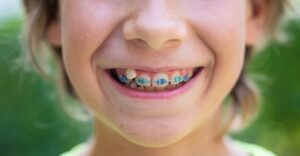A Real-Life Story
Emma, a 13-year-old middle schooler, had just gotten her braces. That evening, while trying to eat dinner, she winced and told her mom, “My teeth feel sore... even my face feels tight.” Her mom felt awful and wondered: Do braces always hurt this much? Are there more comfortable options?
If you're a parent asking similar questions, you're not alone. Let’s take a closer look at whether braces hurt, how long it lasts, and which types of braces are more comfortable for kids.
1. Why Do Braces Hurt?
Braces work by applying gentle, continuous pressure to shift teeth into better positions. As teeth move, the surrounding bone and tissue adjust—which can cause discomfort, especially in the first few days.
Most kids feel soreness or tenderness during the first 2–3 days after getting braces. They might also feel pressure when biting or chewing. After about a week, the discomfort usually fades. Kids may also feel sore again after each adjustment.
The pain is normal and temporary—it’s a sign that the braces are working.
2. Which Type of Braces Is More Comfortable?
There are several types of braces available today, and each has different levels of comfort.
🦷 Traditional Metal Braces
- Pros: Strong, effective, and affordable
- Cons: Can irritate the inside of the cheeks and lips
- Comfort: More noticeable discomfort, especially at the beginning
- Best for: Most kids and teens
🦷 Ceramic Braces
- Pros: Tooth-colored, more discreet
- Cons: Can be more fragile, slightly more expensive
- Comfort: Slightly better than metal braces
🦷 Self-Ligating Braces (e.g., Damon Braces)
- Pros: Use fewer parts, lower friction, smoother movement
- Comfort: Generally more comfortable and require fewer adjustments
🦷 Clear Aligners (e.g., Invisalign)
- Pros: Removable, almost invisible, gentle on the mouth
- Cons: Require strict wear time (20+ hours/day), costlier
- Comfort: One of the most comfortable options if worn properly
3. How Can Parents Help Ease the Discomfort?
Here are some parent-tested tips to help kids feel better during the adjustment phase:
- Orthodontic Wax: Apply it to sharp or irritating parts of the braces
- Soft Foods: Offer mashed potatoes, yogurt, soups, and smoothies
- Cold Packs or Cold Water: Help reduce soreness
- Mild Pain Relievers: Use only under a doctor’s advice
- Encouragement: Let your child know it gets easier—usually after a few days
4. Choosing the Right Braces for Your Child
When deciding, think about your child’s:
- Age and dental needs
- Sensitivity to pain
- Appearance concerns
- Willingness to follow care instructions
- Your budget
A good orthodontist will help you choose the best option and make the process as smooth as possible.
Final Thoughts
Yes, braces can be a little uncomfortable at first—but it doesn’t last forever. Emma, after just a few weeks, said:
"It’s not so bad anymore. And my teeth are already starting to look better!"
With your support and the right guidance, your child can move through the braces journey confidently and comfortably.













